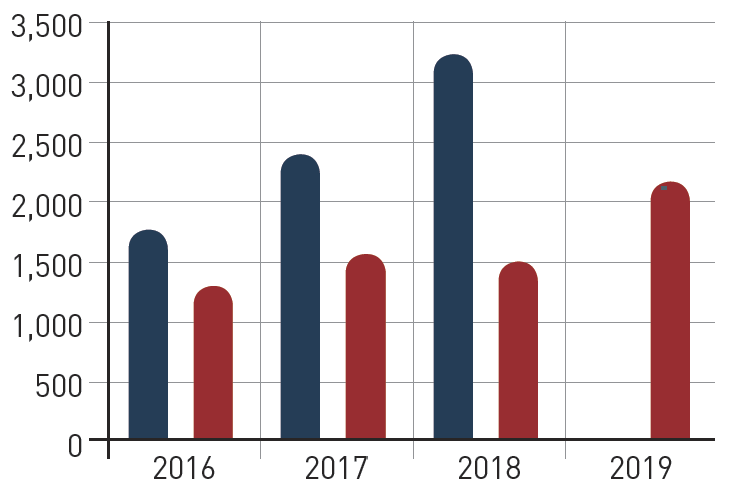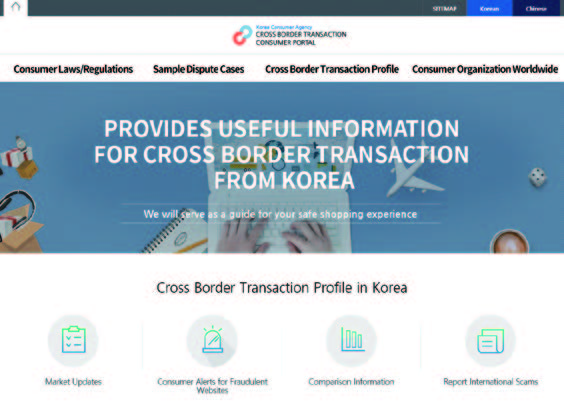Black Friday is coming! Black Friday is the day after Thanksgiving Day, the last Thursday of November in the United States (US). The biggest sale of the year is held on this day. Although Black Friday is a big event in the US, many Koreans are looking forward to the day. This is because of the overseas direct purchases where we can buy things at a much lower price than in Korea. Therefore, the Sungkyun Times (SKT) will find out about overseas direct purchases and problems with these purchases.
Overseas Direct Purchases, Borderless Shopping
Status of Overseas Direct Purchases
Overseas direct purchases are cross border transactions where consumers buy products through foreign online shopping sites or purchasing agent websites. This direct purchasing market is growing explosively every year. According to the Korea Customs Service (KCS), imports of direct purchases exceeded 1.5 billion dollars in the first half of 2019, increasing 20% year-on-year. As Chinese Single’s Day and Black Friday are coming soon, imports are expected to reach 3 billion dollars this year, just two years after reaching 2 billion dollars in 2017. The US ranked first with the market share, followed by China, Europe, and Japan.

In particular, China has seen a steep rise in the market share. This year, electronic products such as wireless earphones, airpurifiers, and health food continue to gain in popularity. Besides this, delivery agents have seen an increase in their business. Delivery agencies receive products in the country on behalf of customers and ship them to Korea after receiving agents’ fees. Usually, when direct delivery to Korea is not possible or is too expensive, consumers use a delivery agent service. There are many delivery agencies such as Malltail, Iporter, and Uniauction.
Why Purchase Directly from Overseas?
Cheaper prices are the biggest reason for direct purchases. According to a Korea Consumer Agency (KCA)’s survey of 1000 consumers in 2018, 78.1% of consumers chose ‘cheaper prices than in Korea’ as the reason for overseas direct purchases. In addition, consumers feel that direct purchases are on average 27.7% cheaper than domestic prices. For instance, the Dyson V10 vacuum cleaner’s price in Korea is about 910 dollars, whereas the US price is 699.99 dollars. Particularly on sale days, the product price is often cheaper than the lowest prices in Korea, even if customers have to pay both customs and shipping costs. Moreover, products under 150 dollars and 200 dollars from the US are exempt from customs duty. Consumers can also purchase products that are not imported into Korea. In the above survey, 62.2% of people chose to buy hard-to-find products in Korea through overseas direct purchases. They can find products that are not released in Korea or brands that have not been launched here.
Problems with Overseas Direct Purchases
Difficulty in Claiming Compensation
In the KCA’s survey in 2018, 55.9% of consumers using overseas direct purchases experienced inconvenience. By type, 53.8% of consumers saw a delay and loss in shipping, 24.9% received defective products, and 24.7% were rejected in refund. Unlike Korea, foreign online malls are not under Korean law and have different regulations mall by mall. Therefore, when conflicts happen, consumers have to deal directly with sellers. Due to the characteristics of direct purchases, there are many risks such as undelivered, delayed, damaged or lost deliveries. Sometimes, however, sellers refuse to cancel orders or demand excessive refund fees. In these cases, some consumers give up their actions because it is not easy for consumers to protest and request exchange or refund in foreign languages.
Lack of After Service
After Service (A/S) is one of the representative side effects of direct purchase. Usually, foreign business registrations are exempt from the Korean Framework Act on Consumers. For example, with Dyson, directly purchased products must receive A/S from the country where products were sold. Xiaomi offers A/S for officially imported products only. In addition, products from other countries often use different parts from domestic products, which makes A/S more difficult. Although there is a worldwide warranty that provides A/S everywhere that the company is located in, Samsung has reduced its A/S period from two years to one year as direct purchases were activated. In the case of electronic products, the absence of A/S is a greater risk because the different voltages can cause a greater rate of malfunctions.
Potential Risks of Personal Information Leakage
When making payments by credit cards, consumers could be a target in crimes of stealing credit card numbers. Recently, form-jacking is becoming a problem in online shopping malls. Form-jacking plants malignant codes in an online payment system based on Java script that fill in credit card numbers, expiration dates, and CVC numbers on web pages. According to Symantec, the world’s biggest cybersecurity company, the number of form-jacking attacks blocked by Symantec in 2018 was over 3.7 million and more than 1 million of which were blocked during the peak shopping season in November and December. Symantec expected that the actual number of attacks was higher. Credit card information stolen through form-jacking could be exploited for financial fraud or traded in the dark markets.
For Safe Overseas Direct Purchases
Measures for Consumers on Government Level
The KCA has currently signed a Memorandum of Understanding (MOU) with seven countries: the US, Japan, Thailand, Vietnam, Singapore, Hong Kong, and the United Kingdom. When consumers request solutions for disputes on the Cross-Border Transaction Consumer Portal, the KCA conveys the request to overseas consumer institutions. The situation is better for countries that have signed the MOU, but in other countries, the KCA has to contact the sellers directly and that does not have a legal force, making it difficult to resolve these problems. Therefore, the government needs to establish a network with various countries for consumers.
Consumers’ Caution

A cautious attitude of consumers is also important. One should be careful of inaccurate information found in online communities or Internet search results. When dealing with foreign sellers whose identities are unknown, consumers should use a method of retaining their transaction history such as credit cards. Also, before purchasing, check the exchange and refund policy of the online shopping mall carefully. If fraud is suspected, it is possible to check the list of sites being suspected through the Cross-Border Transaction Consumer Portal. Moreover, when using a delivery agency, clients can apply for a responsible compensation system to a agency that compensates for product damage or loss.
What a convenient world we live in, where one can buy products that one could not buy otherwise. Overseas direct purchases are a wise and reasonable consumption, but attention is needed due to their complex processes and greater risks compared to domestic purchases. Let’s enjoy direct purchases with careful confirmation and decision making.
